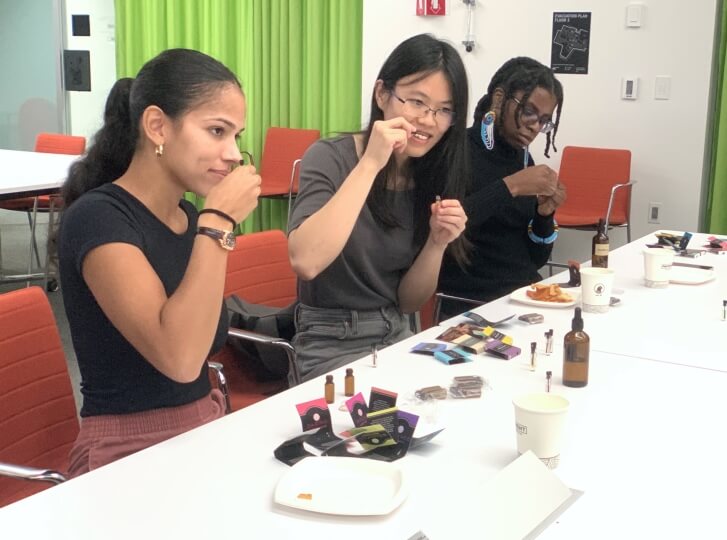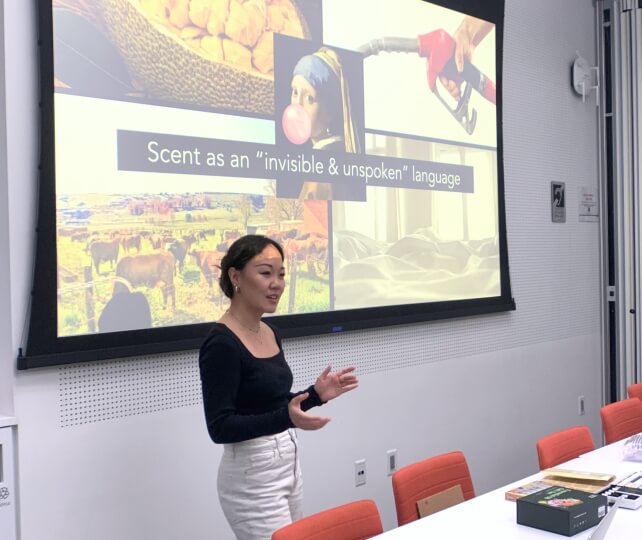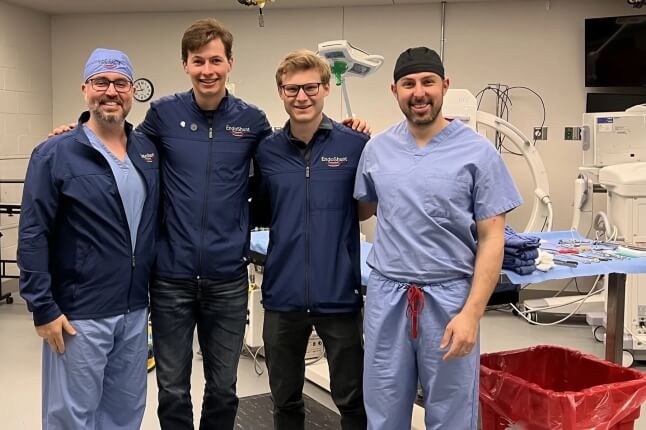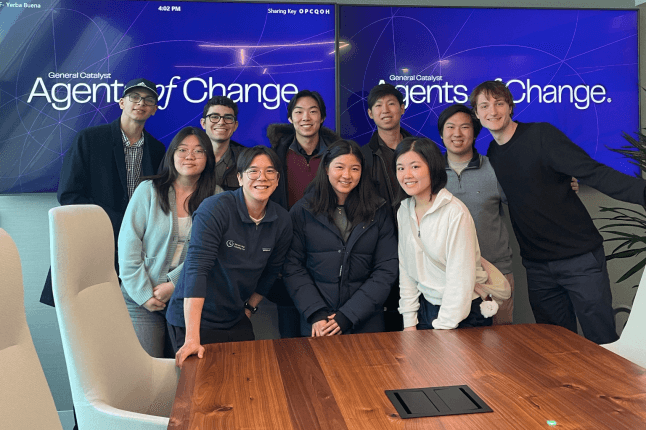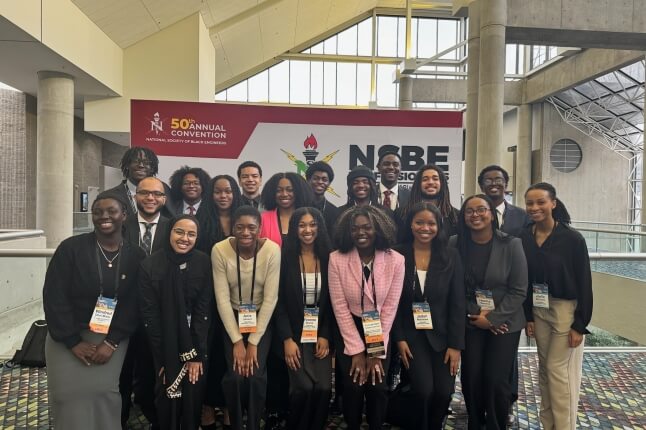News
SEAS post-baccalaureate student Eva Langenbrunner, left, smells a homemade perfume at an HGWISE event at the Science & Engineering Complex. (Matt Goisman/SEAS)
Waves of scents emanated from a third-floor classroom at the Science and Engineering Complex (SEC) on a Friday night in late October. Citrus and berries mixed with fresh flowers or old forests, as one smell overwhelmed the others for a moment, only to just as suddenly fall into the background. The smells intoxicated, drew people in, and created a sense of community, shared interest and curiosity.
If that sounds like something out of a perfume commercial, it should. Kathy Liu, a second-year Ph.D. student in materials science and mechanical engineering at the Harvard John A. Paulson School of Engineering and Applied Sciences (SEAS), recently ran a workshop on the science of perfume and other scent products at the SEC. The workshop was one of the first events of the year for the Harvard Graduate Women in Science and Engineering (HGWISE), a student-run organization. Liu and HGWISE plan to run similar workshops on the Cambridge and Longwood Medical campuses later this year.
“Perfume is something where I was so stunned at the divide between marketing and science,” said Liu, who is a member of the Biomineralization and Biomimetics Lab, led by Joanna Aizenberg, the Amy Smith Berylson Professor of Materials Science and Professor of Chemistry & Chemical Biology. “A lot of beauty products are now marketed with science, such as listing the ingredients, but perfume still isn’t. The science that goes into crafting fragrances is incredibly rich and complex. It’s also something that people can dip their toes into in a workshop.”
The event, which drew about a dozen students, featured a short presentation from Liu on the history of perfume and the science of smelling. Human nasal bulbs and tracts contain sensors tuned to specifically shaped molecules. When someone inhales, those molecules bind to the sensors, which communicate what the molecule is to the brain. Those sensors also link to parts of the brain connected with memory, which is why certain smells can bring on a sense of nostalgia.
Scent is almost an invisible and unspoken language for conveying things that you can’t through words. Perfume is a $30 billion industry that combines psychology, chemistry, neuroscience and business.
The workshop had students combine various essential oils and ingredients with jojoba oil to create their own perfumes, which could then be taken home in small tubes. It was a hands-on opportunity to see how mixing materials and chemical interactions impact their odor, as each novice perfumist had to find the right balance to achieve the desired scent.
SEAS Ph.D. student Kathy Liu presents on the science of perfume and scent at an HGWISE event at the Science & Engineering Complex. (Matt Goisman/SEAS)
“I didn’t fully comprehend how memory relates to scent, but during the workshop I’d smell something and be clearly reminded of something from my past,” said Eva Langenbrunner, a post-baccalaureate student studying mechanical engineering in the Harvard Microrobotics Lab of Robert Wood, Harry Lewis and Marlyn McGrath Professor of Engineering and Applied Sciences.
Liu first ran the workshop last spring. When not in the classroom, Liu likes to make TikTok videos about material science, and came up with the workshop idea after the popularity of videos she’d made about other beauty products.
“I hope people had fun, because that’s the primary goal always, but also felt some extra empowerment to think about the products they use every day and the products marketed to them,” Liu said. “For women in STEM, there’s so much that we know, but we don’t always connect it to our everyday lives. I’m hoping this empowers attendees with new ideas and frameworks of thinking.”
The event attracted students from multiple Harvard schools, including SEAS, Harvard Business School, Harvard Medical School and the Harvard Graduate School of Education (HGSE). For Monica Figueroa, now at the HGSE, workshops like this one have the potential to bridge the gap for students between the advanced science that is taught in classrooms and its practical application in their everyday lives, potentially inspiring more to consider a path of becoming a researcher.
“So much thought was put into this program and presentation, and it was so intentional and well-done,” Figueroa said. “In all my time at Harvard, it’s definitely one of the best student-run workshops I’ve attended.”
Like many Harvard student organizations, HGWISE saw its membership decline dramatically due to the pandemic. When restrictions on in-person events began to ease last year, club president Kiwi Florido tried to revamp HGWISE’s approach to draw in new members. That led to an increase in social events like the workshop, as well as more events geared around professional development.
“I’m a woman in science, and we’re heavily underrepresented,” said Florido, a fifth-year Ph.D. candidate in Biological Sciences in Public Health at the Harvard T.H. Chan School of Public Health. “I was trying to find a place where I could belong and be part of a mission I supported. Our club and events are open to everyone and anyone on campus.“
Students create homemade perfumes at an HGWISE event at the Science & Engineering Complex. (Matt Goisman/SEAS)
Daria Paulis and Monica Figueroa create perfumes at an HGWISE event at the Science & Engineering Complex. (Matt Goisman/SEAS)
Topics: Graduate Student Profile, Materials Science & Mechanical Engineering, Student Organizations
Cutting-edge science delivered direct to your inbox.
Join the Harvard SEAS mailing list.
Press Contact
Matt Goisman | mgoisman@g.harvard.edu
